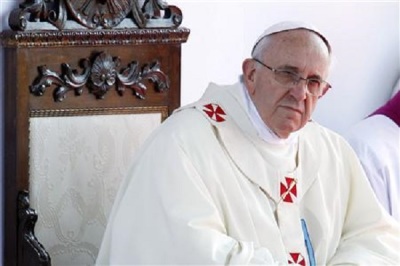Home Depot Founder Says Pope Francis' Criticism of Capitalism Not Sitting Well With Rich Donors

Although Pope Francis is hardly the first Vatican figurehead to critique the free market, his criticisms have not gone unnoticed by certain would-be donors of the Catholic church.
Home Depot founder and investor Ken Langone, who is currently leading the $180 million fundraising efforts to complete the renovations on St. Patrick's Cathedral in New York City, recently told CNBC that a potential million dollar donor has voiced apprehension about donating to the project after Pope Francis critiqued trickle-down economics in November as "naïve trust in the goodness of those wielding economic power."
"In this context, some people continue to defend trickle-down theories which assume that economic growth, encouraged by a free market, will inevitably succeed in bringing about greater justice and inclusiveness in the world," Pope Francis wrote.
He also added in the 224-page document that "this opinion, which has never been confirmed by the facts, expresses a crude and naïve trust in the goodness of those wielding economic power and in the sacralized workings of the prevailing economic system."
Langone, who discussed the donor's anxiety with the archbishop of New York, Cardinal Timothy Dolan, said he told the American church leader that he hoped that the pope's words were "one more hurdle I hope we don't have to deal with. You want to be careful about generalities. Rich people in one country don't act the same as rich people in another country."
Dolan said that the pope was not trying to slam the wealthy and said that the donor's interpretation was "a misunderstanding of the Holy Father's message. The pope loves poor people. He also loves rich people."
Langone also said that he hopes Pope Francis recognizes the generosity of the wealthy in the United States as "there is no nation on earth that is so forthcoming, so giving," an assertion backed by the World Giving Index which states that proportionally more "Americans give than the population of any other country."
Dolan said that the pope does recognize Americans' fiscal generosity and has expressed personal gratitude for it.
"In the one long sit-down that I had with him, the Holy Father told me that he has a lot of gratitude for the generosity of the Catholic Church in the United States. He's aware of our help to the missions, to the poor of the world, to international development, to peace and ... justice," Dolan told CNBC. "So I know that he's very grateful for the ... legendary generosity of the Catholic Church in the United States."
Pope Francis' capitalism critiques are not uncommon from the Vatican. Although Pope John Paul II presided over years that saw capitalism become the dominant economic system after the communist USSR fell – an overhaul in government that he was influential in catalyzing – he nevertheless offered qualified support of it.
When asked in 1991 if "capitalism should be the goal of the countries now making efforts to rebuild their economy and society," the then-pope responded that "the reply is certainly negative" "if by capitalism is meant a system in which freedom in the economic sector is not circumscribed within a strong juridical framework which places it at the service of human freedom in its totality and which sees it as a particular aspect of that freedom, the core of which is ethical and religious."
In 2007, just prior to the global recession, Pope Benedict worried about increasing inequality, writing that "starvation and ecological emergencies stand to denounce, with increasing evidence, that the logic of profit, if it prevails, increases the disproportion between rich and poor and leads to a ruinous exploitation of the planet."
He suggested, though, that "when the logic of sharing and solidarity prevails, it is possible to correct the course and direct it towards an equitable, sustainable development."





















